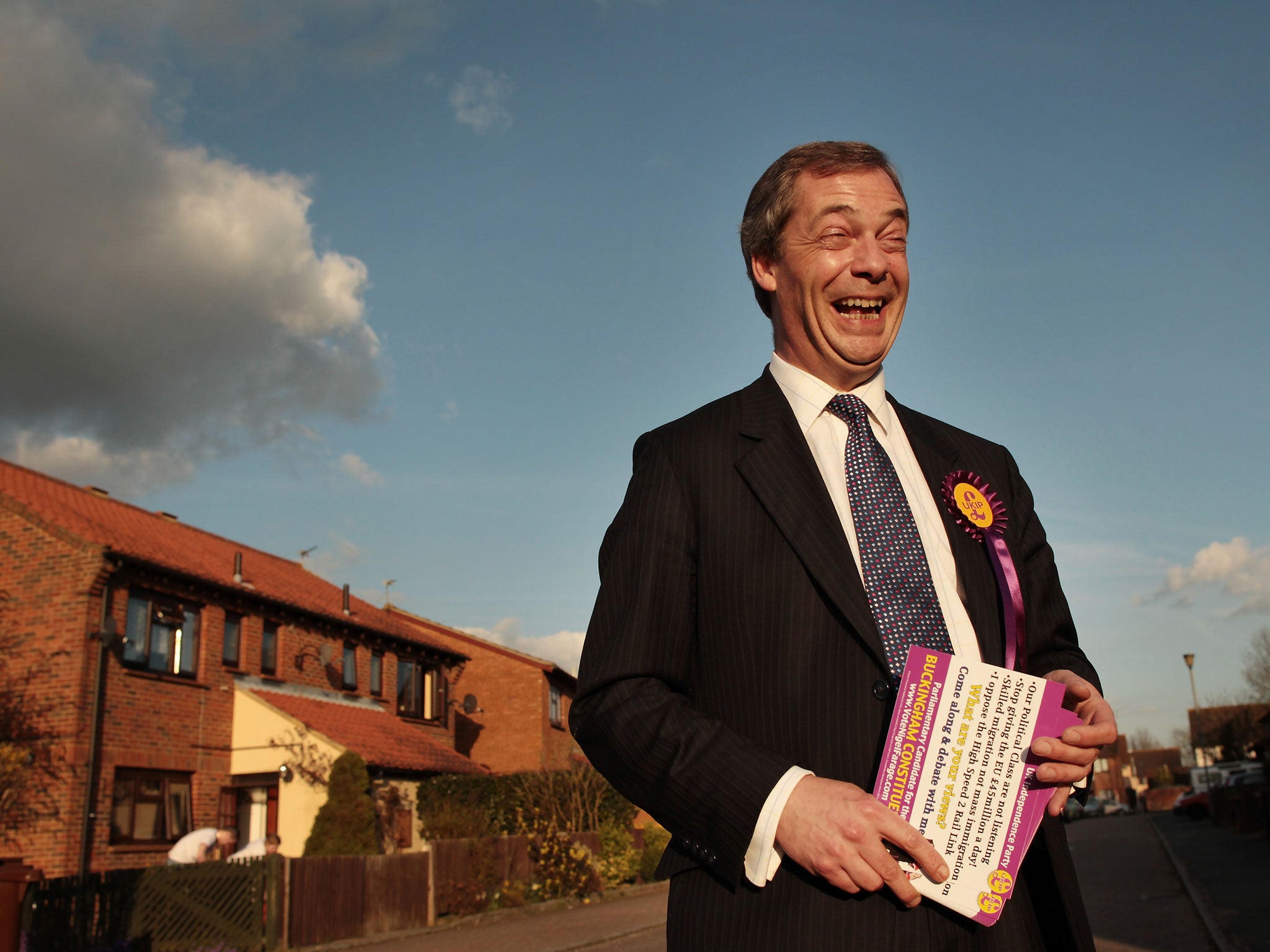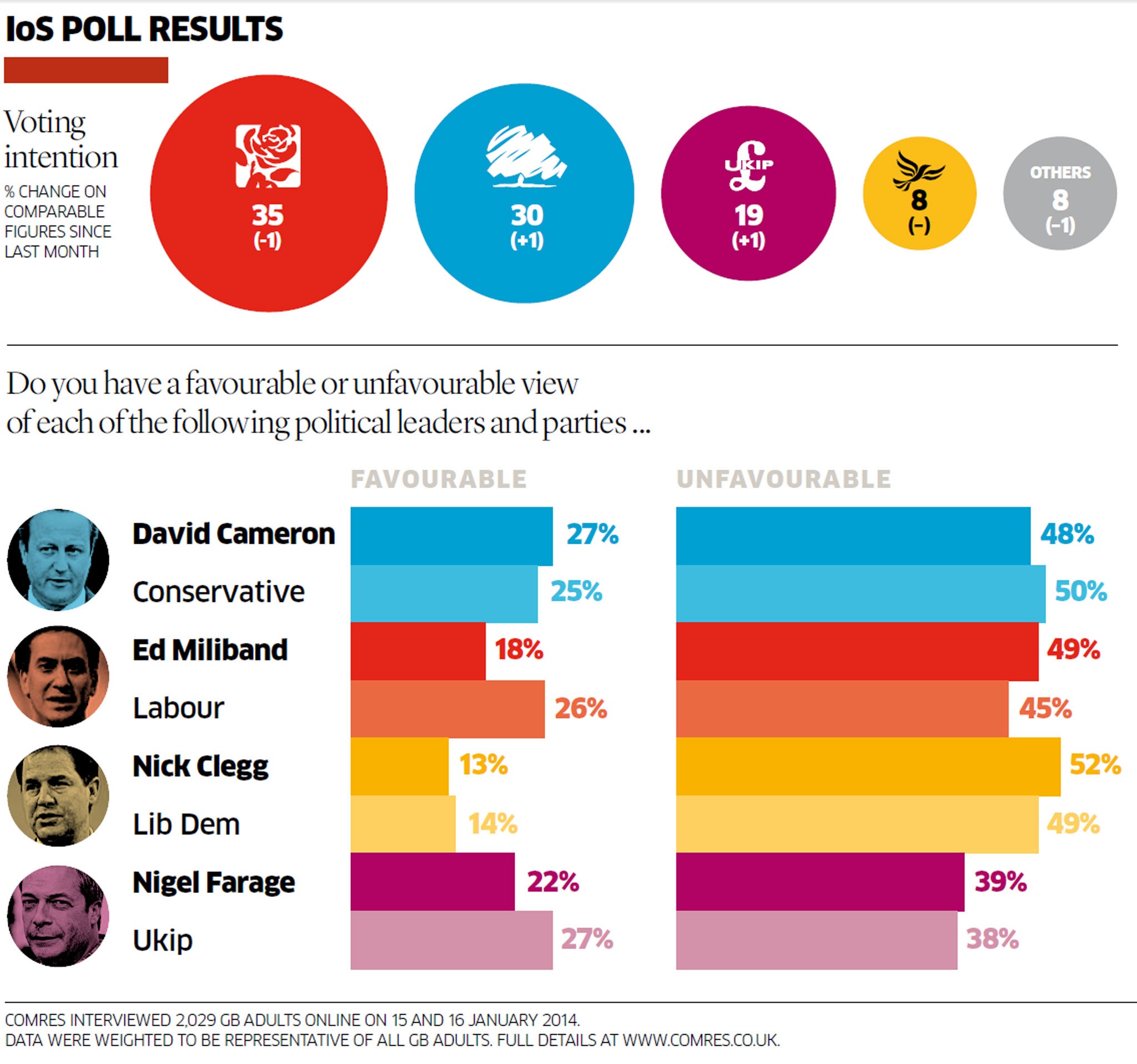Ukip tops Independent on Sunday poll as the nation’s favourite party
In a shock result for David Cameron and Ed Miliband, Nigel Farage’s ‘fruitcakes’ are in pole position

The UK Independence Party is the nation’s favourite political party, a poll for The Independent on Sunday reveals today.
Voters regard Nigel Farage’s party more favourably than Labour, the Conservatives or the Liberal Democrats. The surprising finding will underline concerns inside the mainstream Westminster parties that Ukip is on course to come first in May’s European elections and could deny Labour or the Tories an outright victory in next year’s general election.
What is more, Mr Farage is favoured over Ed Miliband and Nick Clegg as a party leader, beaten only by David Cameron, the ComRes survey reveals. Ukip is the favourite choice of 27 per cent of voters, while Labour is favoured by 26 per cent. The Conservatives are next, on 25 per cent, and the Lib Dems last, on 14 per cent. Although the differences in the first three parties are within the margin of error, the findings will fuel unease inside Downing Street that the Prime Minister has failed to close down the question of Europe and that Ukip’s support remains strong. A YouGov poll last week suggested that Ukip could come second behind Labour in the European elections.
Questioned about the individual party leaders, Mr Cameron wins most support, with 27 per cent; Mr Farage is favourite for 22 per cent; Mr Miliband is backed by 18 per cent of voters and Mr Clegg 13 per cent. Men are more likely than women to favour Ukip – 31 per cent compared with 23 per cent.

However, asked how they would vote if there were an election tomorrow, the situation is more familiar: Labour leads on 35 per cent, down one point from last month, the Conservatives are up one point, to 30 per cent, while Ukip is also up one, to 19 per cent. The Lib Dems, who are being battered by the Lord Rennard saga, remain static on 8 per cent. Crucially for the Tories, while 78 per cent of Conservative voters have a positive view of Mr Cameron, only 17 per cent of Ukip voters feel the same way – meaning that the PM has an uphill struggle to convince them to return to the fold.
Despite Ukip’s soaring popularity, its credibility was dented last night when a Ukip councillor claimed that the recent flooding across the country was the fault of Parliament voting in favour of gay marriage. David Silvester, a councillor in Henley-on-Thames, defected from the Conservatives in 2012 because of his opposition to same-sex marriage. In a letter to his local newspaper, the Henley Standard, Mr Silvester wrote: ”The scriptures make it abundantly clear that a Christian nation that abandons its faith and acts contrary to the Gospel ... will be beset by natural disasters such as storms.”
The ComRes poll also reveals that Boris Johnson has the lead over Theresa May on the question of who should succeed Mr Cameron – by 29 per cent to 24 per cent.
A third of voters (35 per cent) believe George Osborne is right to seek a further £12bn in welfare cuts, while 40 per cent disagree. Questioned about Mr Miliband’s pledge to save the middle class, 37 per cent of voters say this group of people has become worse off under the coalition than it would have been under Labour, compared with 27 per cent who disagree. But 33 per cent say middle-class families will be worse off if Mr Miliband becomes prime minister than if Mr Cameron is re-elected.
Labour will press on with its series of speeches on the cost of living, with a speech tomorrow by Rachel Reeves, the party’s spokesperson on work and pensions. She will unveil plans to get Britain’s jobless back into work, as new figures reveal that long-term youth unemployment has reached its highest level for more than 20 years. The number of people aged under 25 and out of work for a year or more has risen to 282,000, the highest since 1993, when John Major was PM.
Ms Reeves will say that long-term unemployment, low pay and insecure jobs are adding to costs for taxpayers. The youth unemployment figures were uncovered in a parliamentary question by Labour MP Stephen Timms, who said last night: “These shocking figures show how the Tories are completely failing to tackle the long-term unemployment faced by hundreds of thousands of young people. The last time long-term youth unemployment reached the levels we are seeing was under the last Tory government.”
Join our commenting forum
Join thought-provoking conversations, follow other Independent readers and see their replies
Comments